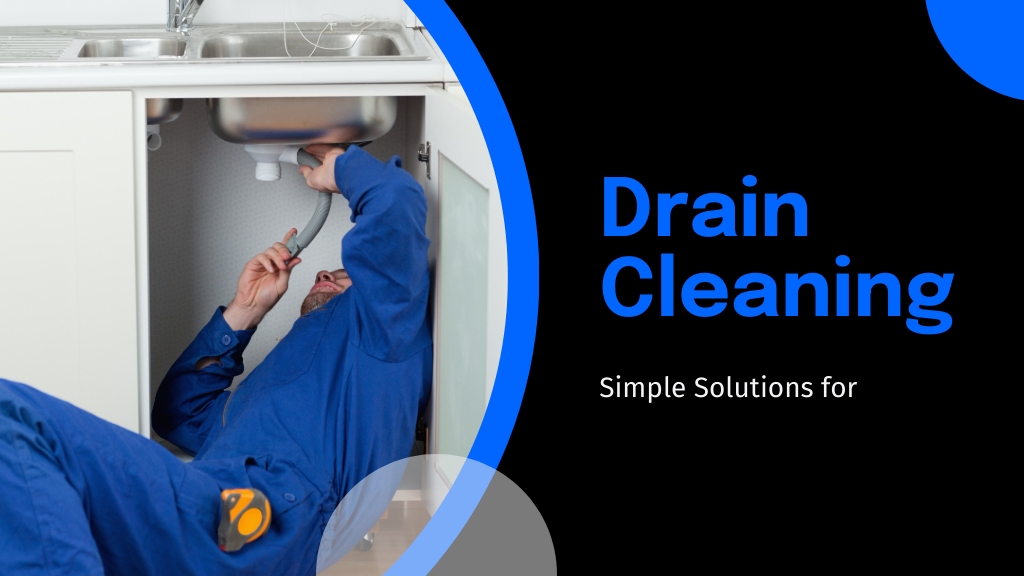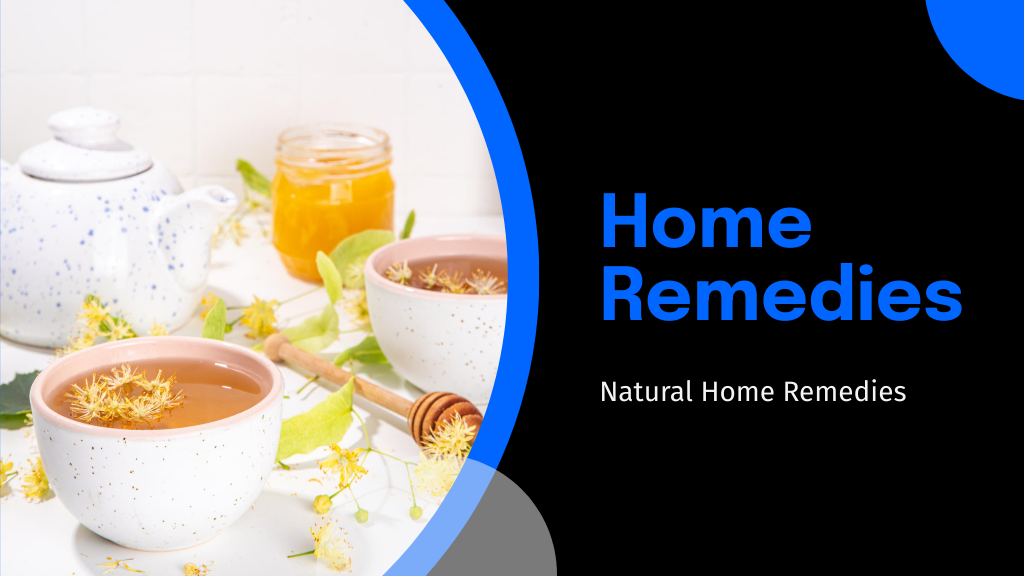
For effective drain cleaning, start by frequently flushing drains with hot water to clear minor build-ups. For stubborn clogs, a blend of baking soda followed by vinegar creates a powerful, natural reaction; cover and let fizz for ten minutes, then flush with more hot water. If these steps don't work, you might consider a manual drain snake or plunger. Remember, regular maintenance can prevent severe blockages, and there's always more to discover about keeping your drains running smoothly.
Identifying Common Causes of Drain Clogs
Understanding the common causes of drain clogs can save you a lot of hassle. When you're facing a slow or stopped drain, it's often due to hair, grease, or food particles that have built up over time.
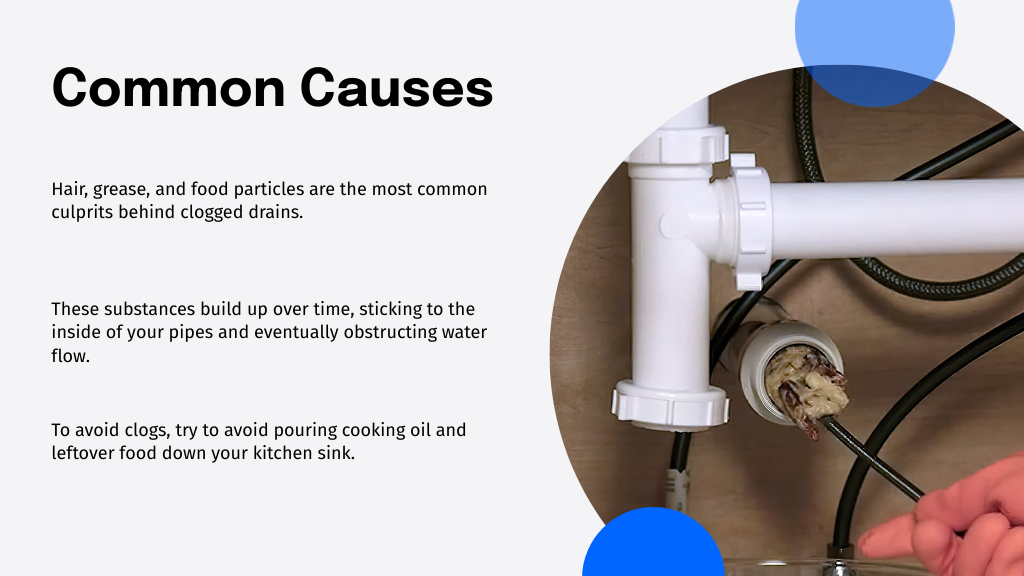
These substances stick to the inside of your pipes and gradually accumulate until the flow of water is obstructed. Using a clogged drain cleaner can be a quick fix, but knowing what contributes to these blockages can help you prevent them in the first place.
For instance, avoid letting cooking oil and leftover food go down your kitchen sink. In the bathroom, use a drain guard to catch hair and soap scum. Being proactive minimizes your need for harsh chemicals later on.
DIY Drain Cleaning Techniques
Now that you're aware of what commonly blocks your drains, let's explore some effective DIY techniques you can use to clear them.
First, consider a manual drain snake. This tool allows you to physically dislodge any obstructions deep within your pipes. You'll just need to carefully insert the snake, twist, and pull to remove debris.
Alternatively, using a plunger can create enough suction to dislodge minor clogs. It's straightforward: cover the drain with the plunger, guarantee a tight seal, and vigorously pump several times.
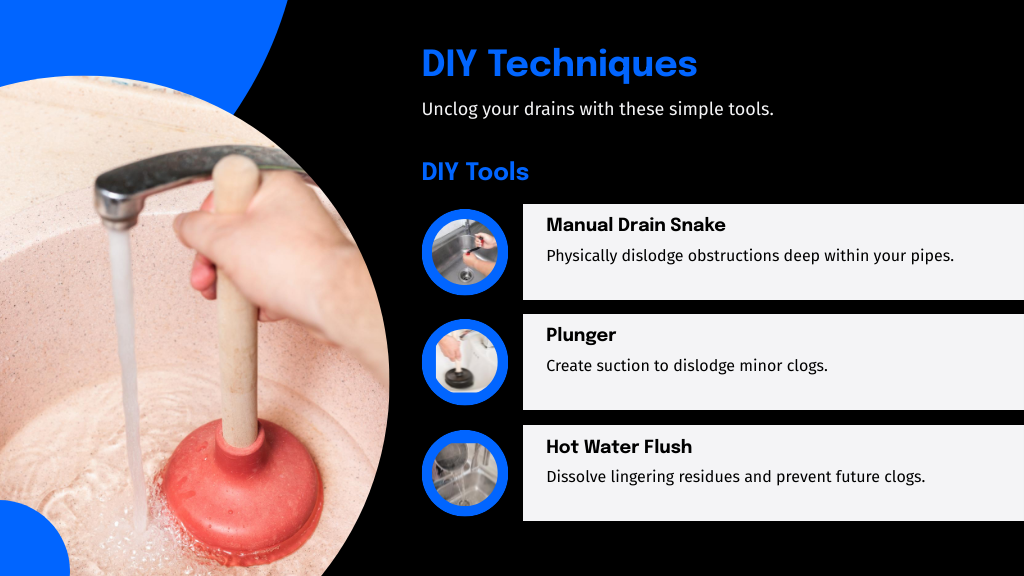
For routine maintenance, flush your drains with hot water weekly to dissolve any lingering residues. These DIY drain cleaning techniques are practical and can save you from more severe blockages down the line.
The Benefits of Baking Soda and Vinegar Solutions
Moving beyond physical tools, you'll find that a combination of baking soda and vinegar can work wonders for clearing your drains. This simple, eco-friendly solution isn't only easy on your wallet but also gentle on your plumbing.
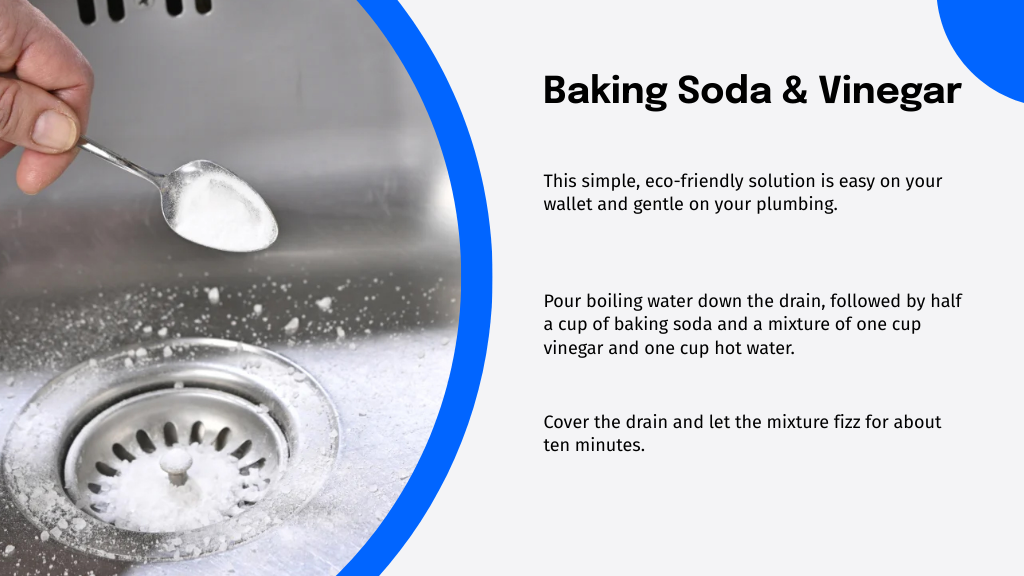
Here's how to clean a drain effectively using these ingredients: Start by pouring a pot of boiling water down the drain. Next, add half a cup of baking soda, followed by a mixture of one cup of vinegar and one cup of hot water.
Cover the drain, letting the fizzy combo work its magic for about ten minutes. Finally, flush with more boiling water. This method helps break down fatty acids and grease, ensuring your drains stay free and flowing.
Using Plungers and Drain Snakes Effectively
When tackling a stubborn clog, you'll want to start by choosing the right plunger; the effectiveness can vary considerably based on the type and fit.
Once you've given plunging a shot, operating a drain snake is your next step to break through deeper blockages. After clearing the clog, it's essential to take measures to prevent future problems, ensuring your drains stay clean longer.
Choosing the Right Plunger
Why consider the type of plunger before tackling a clogged drain? Choosing the right plunger isn't just about grabbing any tool; it's about maximizing efficiency and minimizing effort.
For standard sinks and tubs, a cup plunger is your go-to. It forms a tight seal around flat surfaces, making it perfect for dislodging minor blockages.
However, if you're facing a tough clog in your toilet, switch to a flange plunger. Its extended rubber flap fits snugly into the toilet bowl, enhancing suction and pushing power, making it a more effective drain unblocker.
Don't just attack a clog with any plunger. Picking the specific type suited for your drain's shape guarantees you're not wasting time and energy on ineffective methods.
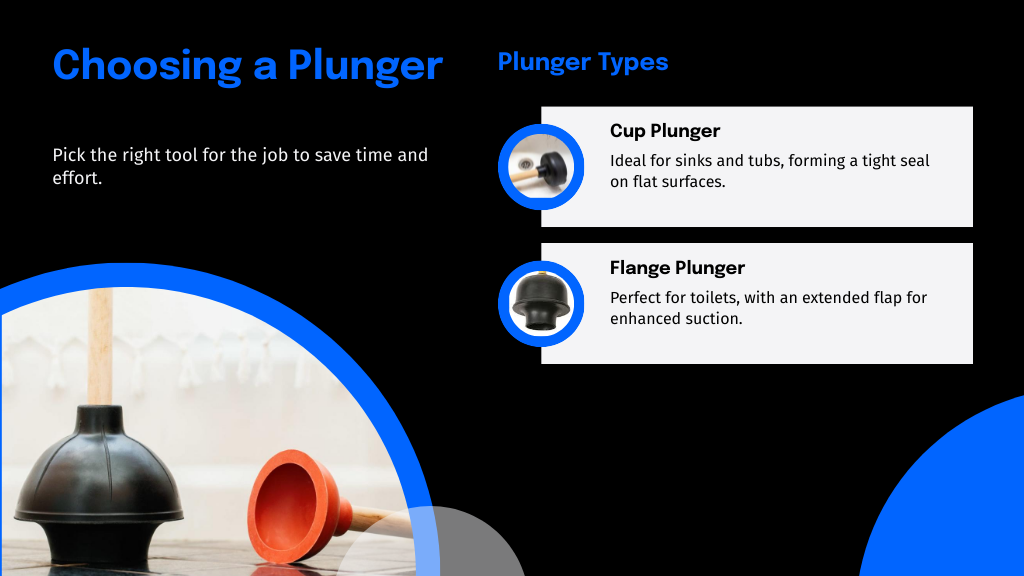
Operating a Drain Snake
Let's plunge into using a drain snake, another effective tool for clearing stubborn clogs. When you're dealing with a tough blockage that plunging can't fix, it's time to grab a drain snake. This tool, essential in plumbing drain cleaning, can navigate through your pipes, reaching debris that's deep within.
To start, slowly feed the snake into the drain until you feel resistance. That's your clog. Now, you'll need to turn the handle, which moves the cable and helps the snake to latch onto the debris. Once you've got a good grip, gently pull the snake out.
It might take a few tries, but persistence often pays off in freeing up your pipes.
Preventing Clogs Post-Cleaning
How can you keep your drains clear after tackling a tough clog with a plunger or drain snake? First off, it's important to use your tools wisely. When you've cleared a blockage with a plunger or snake, running hot water through the pipes can help flush out any remaining debris. This prevents new clogs from forming quickly.
Additionally, consider using enzyme-based drain cleaners periodically. These cleaners maintain pipe health without the harshness of chemical-based products, breaking down organic matter that might start future clogs.
Don't forget to cover drains with strainers to catch hair and food scraps, which are common culprits. Regular maintenance, combined with careful use of plungers and snakes, will keep your drains running smoothly.
When to Choose Chemical Drain Cleaners
Although chemical drain cleaners can be effective, you should consider them only after other methods have failed. These products are potent solutions that can tackle tough clogs that simpler, milder methods can't clear.
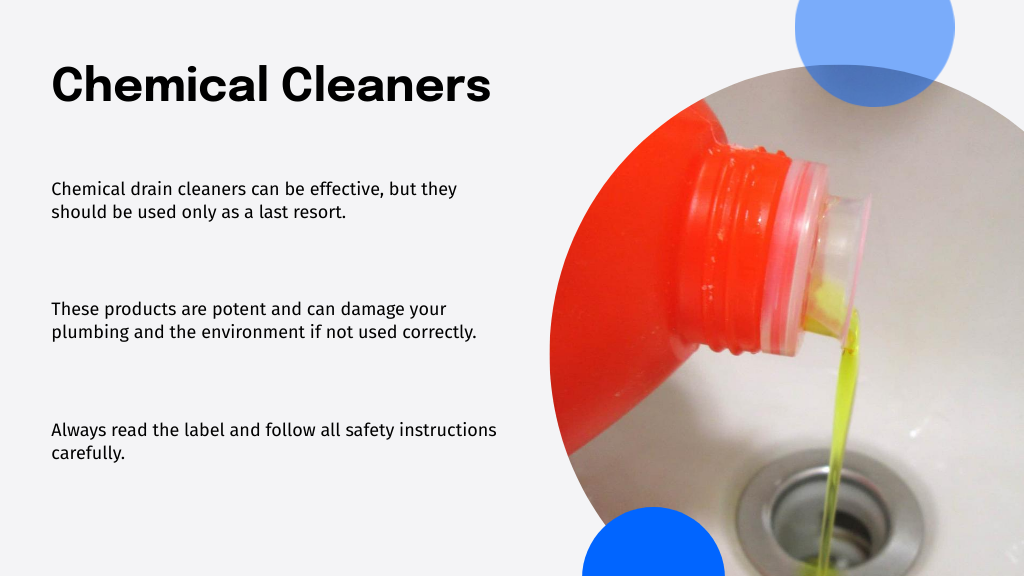
If you're facing persistent blockages or slow drainage that plungers and enzymatic cleaners haven't resolved, it might be time to try a chemical option.
Choosing a good drain cleaner means reading labels and understanding the type of clog you're dealing with—grease, hair, organic matter, etc.
Always use these cleaners as a last resort because they can be harsh on your plumbing and the environment. Be sure to follow all safety instructions to avoid damage to your pipes or harm to yourself.
Professional Drain Cleaning Services: When to Call In the Experts
Sometimes, despite your best efforts, you'll encounter signs of severe clogs that just won't budge. That's when it's essential to evaluate the benefits of expert intervention, as professionals can address these issues swiftly and effectively.
Particularly in emergency situations, a quick response from seasoned experts can prevent further damage and costly repairs.
Signs of Severe Clogs
When your drains start backing up more frequently, it's a clear sign you might be dealing with a severe clog. Recognizing these signs early can save you from more extensive and expensive drain cleaning processes down the line.
Here are some vivid indicators that it's time to reflect on professional help:
- Gurgling Sounds: Each time you flush or drain water, ominous gurgling noises emerge from the depths.
- Slow Drainage: Water pools ominously, draining sluggishly as if wading through a swamp.
- Bad Odors: Persistent, unpleasant smells waft up, suggesting decay hidden within your pipes.
- Repeated Blockages: Your usual quick-fix solutions no longer keep the waters at bay, indicating a more tenacious beast lurks below.
Benefits of Expert Intervention
Recognizing severe clogs is just the first step; addressing them effectively requires professional expertise. When you're facing persistent or complex blockages, calling in experts for drainage cleaning can save you both time and money.
Professionals have the right tools and techniques to safely remove clogs without damaging your pipes. They can also spot potential issues that you might miss, preventing bigger problems down the road.
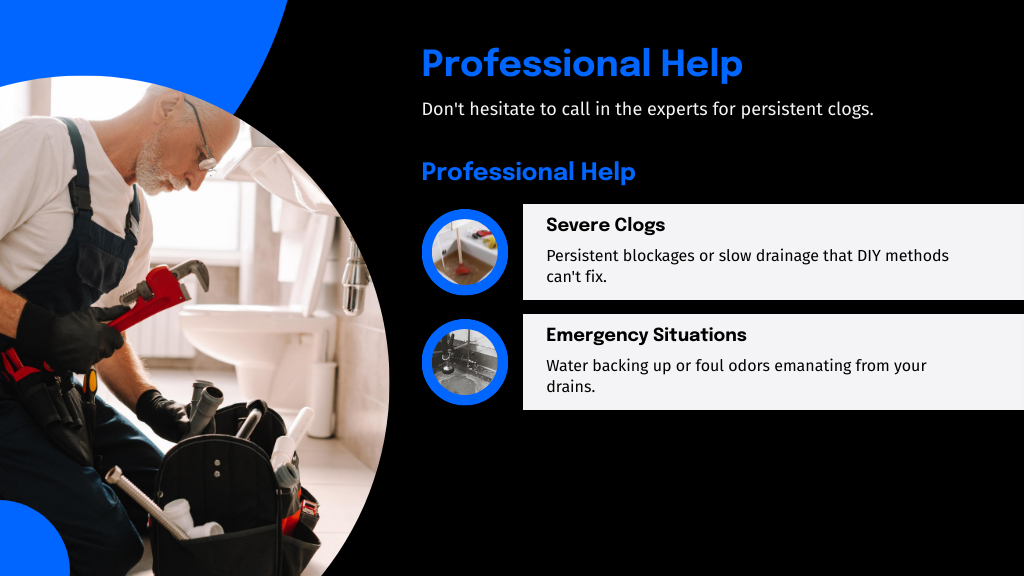
Furthermore, regular professional cleanings can extend the life of your plumbing system, ensuring it operates efficiently for years to come. So, if you're unsure about the severity of a clog, it's smart to rely on experienced hands.
They'll handle the dirty work while you enjoy peace of mind knowing your drainage system is in top shape.
Emergency Situations Response
If you're suddenly faced with water backing up or a foul odor emanating from your drains, it's time to call in the experts. Professional drain cleaning services are essential when you encounter severe blockages that home remedies can't fix.
Here's what you might encounter that signals it's time for expert help:
- Overflowing Toilets: Water spilling over the brim, a nightmare scenario that demands immediate professional attention.
- Gurgling Sounds: These noises indicate a struggling drainage system, often a sign of deep clogs.
- Slow Draining Sinks: Water pooling and draining sluggishly, hinting at blockages far down the pipes.
- Recurring Clogs: Frequent blockages in the same location can suggest a more complex drain cleaning issue.
Don't wait; get expert help to avoid further damage or inconvenience.
Preventative Measures to Keep Drains Clear
To keep your drains clear and functioning efficiently, it's essential to take proactive steps. Regular maintenance is key, and understanding how to clean drain pipes effectively can save you a lot of hassle. Start by flushing your drains with hot water weekly to dissolve minor build-ups.
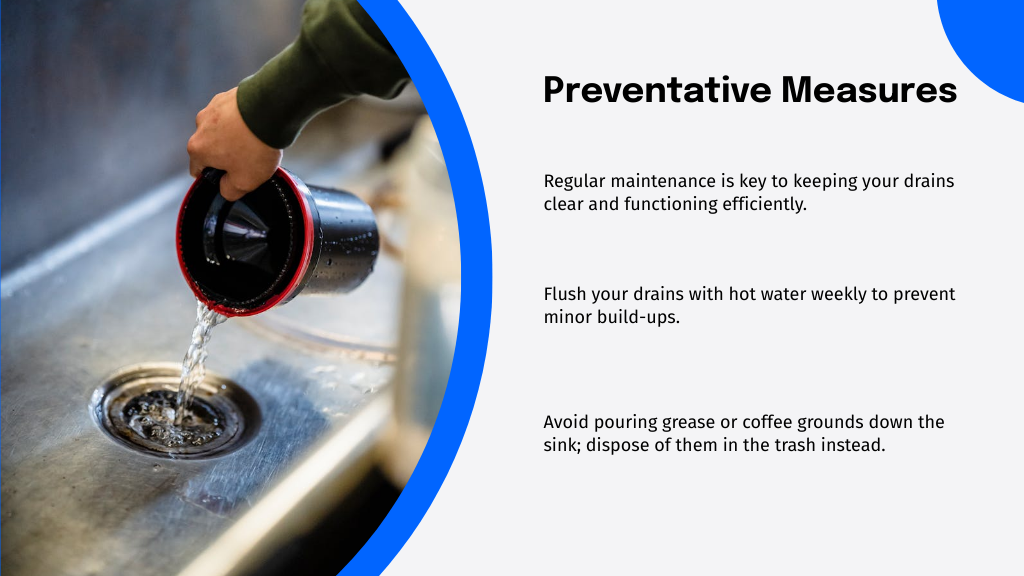
Don't pour grease or coffee grounds down the sink; these are notorious for clogging pipes. Instead, dispose of them in the trash. Use a drain strainer to catch hair and other debris, preventing them from entering your plumbing system.
For a deeper clean, consider using a mixture of baking soda and vinegar monthly. This natural solution helps break down organic materials without harming your pipes.
Conclusion
So, after exploring the mystical domains of baking soda volcanoes and arm-wrestling your plumbing with a plunger, you might feel like a DIY guru. But remember, when your sink starts resembling a mini-swamp, perhaps it's time to admit defeat and call in the pros. Let's face it, those store-bought chemicals promise a quick fix, but they might just be plotting against your pipes. Keep those drains clear, or face the wrath of the ever-dreaded plumber's bill!



